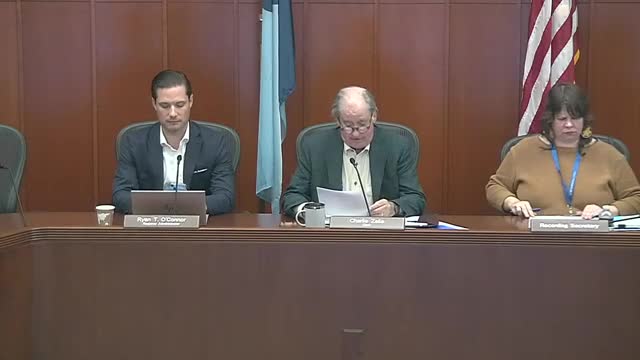Metropolitan Council greenlights major transit center redevelopment
October 10, 2024 | Metropolitan Council, Agencies, Boards, & Commissions, Executive, Minnesota
This article was created by AI summarizing key points discussed. AI makes mistakes, so for full details and context, please refer to the video of the full meeting. Please report any errors so we can fix them. Report an error »

In a recent meeting of the Metropolitan Council's transportation committee, significant developments were discussed regarding the future of transit services and infrastructure in Minneapolis. Council Member Barber introduced two key business items that will impact local transit operations and community development.
The first item, Business Item 2024-204, addresses the planned closure of the Chicago Lake Transit Center, which has served the community since its opening in 2006. The center will cease operations in the fall of 2024 as bus services transition to on-street Bus Rapid Transit (BRT) stations. This change is prompted by the lack of future transit needs for the off-street facility, which has been fully depreciated. The council is seeking to declare the property at 2946 Chicago Avenue South as surplus and negotiate the termination of existing easement agreements with Midtown Exchange Commons LLC. This move is expected to facilitate redevelopment efforts in the area, including plans for an innovation center and affordable housing, thereby enhancing connections along the Grand Promenade.
Council Member Lillard expressed gratitude to the staff for their engagement with various stakeholders throughout this complex process, highlighting the importance of collaboration in community planning. The committee unanimously supported the motion to proceed with the property disposition.
The second item, Business Item 2024-260, focuses on the Midtown Greenway bicycle and pedestrian trail expansion project. The council is set to contract with Kimberly Horn and Associates for planning and engineering services, with a budget not exceeding $534,350. This project aims to create a continuous trail from the eastern terminus of the Midtown Greenway across the Mississippi River to Allianz Field, including a connection to the University of Minnesota campus. The initiative is backed by state legislation and will involve collaboration with multiple local agencies and community stakeholders to ensure comprehensive planning and regulatory compliance.
Both initiatives reflect the council's commitment to enhancing transportation infrastructure and promoting sustainable community development in the Minneapolis area.
The first item, Business Item 2024-204, addresses the planned closure of the Chicago Lake Transit Center, which has served the community since its opening in 2006. The center will cease operations in the fall of 2024 as bus services transition to on-street Bus Rapid Transit (BRT) stations. This change is prompted by the lack of future transit needs for the off-street facility, which has been fully depreciated. The council is seeking to declare the property at 2946 Chicago Avenue South as surplus and negotiate the termination of existing easement agreements with Midtown Exchange Commons LLC. This move is expected to facilitate redevelopment efforts in the area, including plans for an innovation center and affordable housing, thereby enhancing connections along the Grand Promenade.
Council Member Lillard expressed gratitude to the staff for their engagement with various stakeholders throughout this complex process, highlighting the importance of collaboration in community planning. The committee unanimously supported the motion to proceed with the property disposition.
The second item, Business Item 2024-260, focuses on the Midtown Greenway bicycle and pedestrian trail expansion project. The council is set to contract with Kimberly Horn and Associates for planning and engineering services, with a budget not exceeding $534,350. This project aims to create a continuous trail from the eastern terminus of the Midtown Greenway across the Mississippi River to Allianz Field, including a connection to the University of Minnesota campus. The initiative is backed by state legislation and will involve collaboration with multiple local agencies and community stakeholders to ensure comprehensive planning and regulatory compliance.
Both initiatives reflect the council's commitment to enhancing transportation infrastructure and promoting sustainable community development in the Minneapolis area.
View the Full Meeting & All Its Details
This article offers just a summary. Unlock complete video, transcripts, and insights as a Founder Member.
✓
Watch full, unedited meeting videos
✓
Search every word spoken in unlimited transcripts
✓
AI summaries & real-time alerts (all government levels)
✓
Permanent access to expanding government content
30-day money-back guarantee

